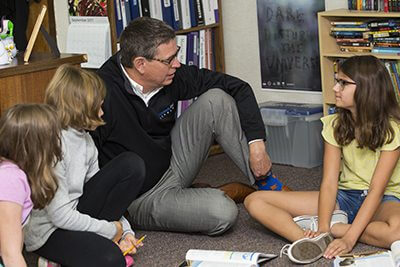October 26, 2017
 by Dr. Bill Hudson, Head of School
by Dr. Bill Hudson, Head of School
I am having a hard time finding balance these days. I think I am pretty good at the work-home balance, but achieving a physical balance is another matter. This week, I broke a bone in my foot and one in my ankle while on an afternoon run. Even with crutches, maintaining a balance is a challenge.
Maintaining balance and achieving well-being seem to be increasingly difficult in today’s society. It is challenging for adults and even more so for our children. It is well documented that anxiety and depression are on the rise for our young people. There are a number of reasons that can be attributed to this growing problem. The pressure of academic achievement, the drive for perfection, homework, and worries about getting into the “right” college can make it difficult for young people to find balance. Social media is also partly to blame. While the data is not yet conclusive, researchers believe the use of social media and smartphones appear to be culpable for the increase in teen mental health. (Jean Twenge, “Have Smartphones Destroyed a Generation?” The Atlantic, Sept. 2017)
Many years ago, MPA initiated a very unique and innovative marketing campaign. One of the taglines was “Competition belongs in the boardroom, not the classroom.” I think it speaks to one of the most distinctive attributes of MPA. Students work hard at achieving good grades, but not at the expense of their relationships with one another and with their teachers. We have a collaborative environment where students support one another and work to achieve their personal best, not to beat their classmates.
There are real and tangible programs and structures that can be put in place to alleviate some of the causes of anxiety and to foster balance and well-being. Strong advisory programs in both the Middle and Upper School share the common goal of looking out for each student to ensure their academic and social success. In Middle School, advisories are designed for academic skill-building, individual support, social skills development, community service, homework assistance, and character development within a safe, nurturing environment. The Upper School Advisory is very similar with the addition of relationship building and fostering humility; that is, increasing empathy and awareness of others to enable students to feel safe asking for help, noticing when help needs to be given, and recognizing that a part of our shared humanity is the ability to lean on one another when needed.
Over the past several years, it has been my goal to increase the support we provide for students in the areas of social, emotional, and mental well-being. An additional 2.8 FTEs have been added to proactively build skills and competencies for students to achieve well-being, as well as assist them and their families when they encounter specific challenges.
The way a school is structured can also help students achieve balance. At a recent gathering I attended of independent school leaders from across the country, many of them were amazed that MPA not only has a block schedule, but that classes in Middle School are on an A and B day rotation and that the Upper School classes alternate quarters. The result is that students can better manage and balance their workloads.
A balance between academics, athletics, and the arts is not only conducive to developing the whole child, it also gives students multiple opportunities to discover, develop, and find confidence and self-satisfaction in areas that they would not otherwise be exposed to. Creative expression in the arts and physical activity in recess and physical education are both important to well-being and preventing anxiety and depression.
In a recent survey of Upper and Middle School students at MPA, responses indicate a well-balanced school culture and climate. In all instances, the percentages exceeded the benchmark of other independent school students in the Midwest.
- 85 percent believe that MPA is a caring community
- 84 percent say that students are well known by teachers and staff members
- 98 percent think the school supports academic achievement
While no school is perfect, and there is always more that we can do, some of the important markers of a school that prioritizes well-being are present at MPA. Know that as a school community, parents, teachers, staff and students, will continue to work together to support our students.